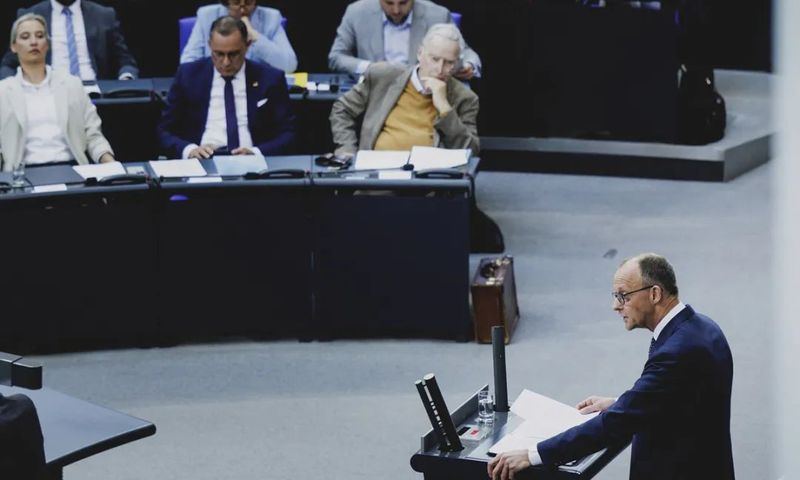
Friedrich Merz (CDU), Federal Chancellor, and the AfD parliamentary group, recorded during the first government statement in the German Bundestag as Federal Chancellor in Berlin, May 14, 2025. Photo: VCG
Germany's new chancellor, Friedrich Merz, outlined his government's agenda to lawmakers in Germany's parliament, the Bundestag, on Wednesday. Elected in a historic second-round vote, he aims for swift action on growth, migration, and defense, according to German media outlet Deutsche Welle (DW).
Germany will take more responsibility for Europe's defense by building the strongest army in the EU, Merz said in a wide-ranging speech, reported Politico.
The federal government will provide all the financial resources that the Bundeswehr needs to become the strongest conventional army in Europe, Merz said. This is more than appropriate for the most populous and economically strongest country in Europe. Our friends and partners also expect this from us, and what's more, they are actually demanding it.
Merz, the leader of the Christian Democratic Union (CDU), assumed office a week ago following his victory in Germany's federal elections in February, which concluded a six-month period during which the European Union's most populous nation was without a government holding a parliamentary majority, according to euronews.
Merz vowed that Germany — Ukraine's second-biggest provider of military aid after the US — would continue to back Kiev, per Politico.
He has already embarked on numerous visits to Berlin's EU partners and has travelled to Kiev alongside his French, Polish, and British counterparts.
In addition, in his speech, the conservative leader reeled off a string of ambitious plans to revive the struggling economy even as it faces a fresh threat from US tariffs. These ranged from boosting competitiveness to slashing corporate tax rates, fixing clapped-out infrastructure and reducing red tape, AFP reported.
Turning to the economy, Merz acknowledged that Germany is currently in recession. He identified excessive bureaucracy, high energy costs, and a burdensome tax regime as key obstacles to growth, Xinhua reported.
When it came to China, Merz stressed it would remain an important partner but that he would keep on pursuing a policy of strategic de-risking, aiming to reduce heavy economic dependencies on the world's number two-economy, according to AFP.
China, Merz said, would remain an important partner of Germany and the EU on global challenges, but he would still push assertively for the respect of agreed rules in the areas of industrial and trade policy, the South China Morning Post reported on Thursday.
Merz's call for strategic de-risking in China policy stands in stark contrast to his expression of viewing China as an important partner for Germany, said Jiang Feng, professor of European Studies at the Shanghai International Studies University and president of the Shanghai Association of Regional and Country Studies.
On the one hand, the German government is eager to revive its economy and cannot afford to bypass China, a major global economic power. On the other hand, over-emphasizing 'strategic risks' in the bilateral relationship may lead German businesses to adopt a more cautious approach toward investing and trading with China, Jiang said, noting that it could trigger heightened scrutiny of joint projects in critical sectors, ultimately constraining the scale and depth of cooperation.
This self-contradictory stance, pushing for more cooperation while simultaneously amplifying risk, could backfire. What is intended to strengthen ties may instead sow distrust and hesitation, undermining the very cooperation both sides seek, the expert warned.
German companies operating in China are calling on Germany's new federal government in Berlin to adopt a more pragmatic and forward-looking policy approach toward China, emphasizing partnership over rivalry, according to the German Chamber of Commerce in China on May 7.
German businesses hope the new administration will concentrate on the topic of China being a partner, Oliver Oehms, executive director and board member of the German Chamber of Commerce in China-North China, told the Global Times in an interview on Wednesday.
Author | Jiang Feng, Research Professor at Shanghai International Studies University, Chairman of Council of Shanghai Academy of Global Governance and Area Studies
Source | Global Times, May 15, 2025




